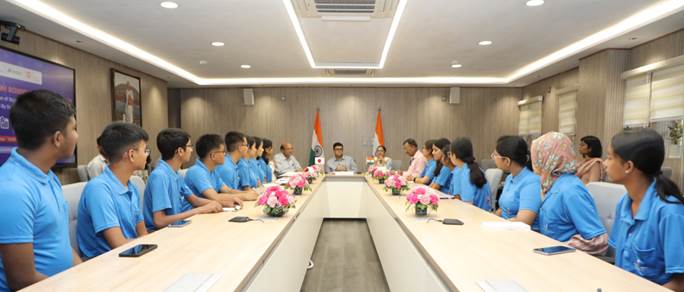Sakura Science High School Programme 2025

- 20 Jun 2025
In News:
- In June 2025, 20 Indian school students were officially flagged off by Shri Sanjay Kumar, Secretary, Department of School Education & Literacy (DoSEL), to participate in the prestigious Sakura Science High School Programme 2025 in Japan.
- The initiative reflects India's growing focus on international educational exposure, scientific collaboration, and experiential learning, in alignment with the vision of the National Education Policy (NEP) 2020.
About the Sakura Science Programme
- Launched by: Japan Science and Technology Agency (JST) in 2014.
- Objective: To promote science, technology, and innovation through Asia-wide youth exchanges.
- India’s Participation: Since 2016; over 619 students and 91 supervisors have participated till 2025.
- Participants (2025 batch):
- 20 students (7 boys, 13 girls) from Jawahar Navodaya Vidyalayas and government schools in Andaman & Nicobar Islands, Ladakh, Mizoram, Nagaland, and Tripura.
- Accompanied by 2 supervisors.
- Programme duration: 15–21 June 2025.
- Participating countries (2025): India, Malaysia, Taiwan, and Ukraine.
Key Features of the Programme
- Hands-on Learning: Visits to advanced scientific labs, tech demonstration centres, and universities in Japan.
- Cultural Exposure: Insight into Japanese traditions, societal values, and innovation ecosystem.
- International Peer Exchange: Interaction with students from other Asian nations to foster global scientific thinking.
Relevance to NEP 2020
The NEP 2020 advocates experiential, holistic, and integrated learning. It highlights:
- The need for educational excursions to places of scientific, cultural, and technological relevance.
- Promoting international collaborations that broaden the intellectual horizons of learners.
- Encouraging innovation through interdisciplinary exposure and real-world learning.
The Sakura Programme complements NEP 2020’s goals by offering Indian students a unique platform to explore global advancements in STEM (Science, Technology, Engineering, and Mathematics) fields.
Strategic Importance
- Science Diplomacy: Strengthens Indo-Japanese relations in education and technology.
- Youth Empowerment: Builds future-ready, globally aware scientific talent.
- Inclusivity: Focuses on students from remote and underserved regions, aligning with India’s equity-focused educational reforms.
